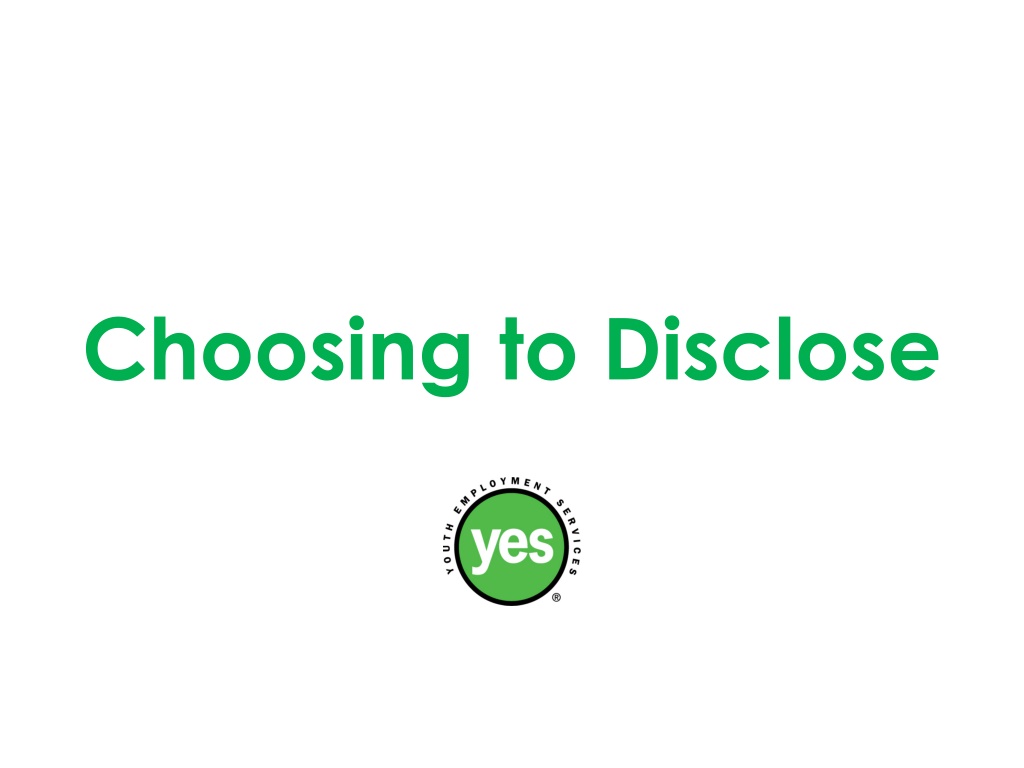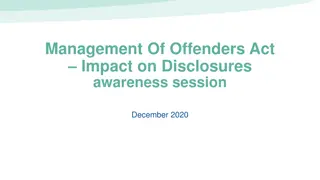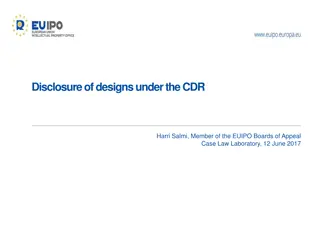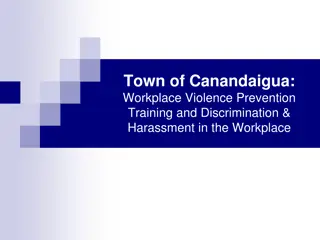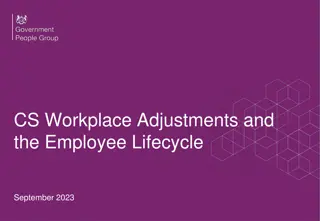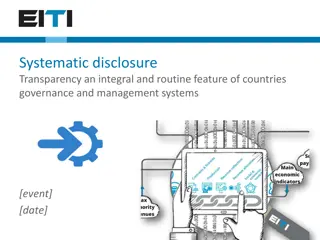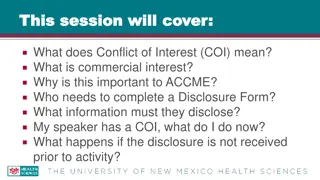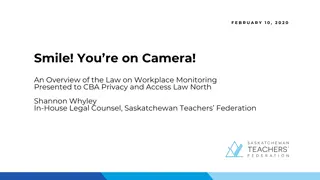Navigating Disclosure in the Workplace: Benefits and Considerations
Disclosure in the workplace involves revealing mental or physical health information to an employer. This act has benefits like protection under legislation, accommodation requests, and combatting stigma. However, there are reasons individuals may choose not to disclose, such as privacy concerns and fear of discrimination. When deciding whether to disclose, it's essential to consider various factors beyond these pros and cons.
Download Presentation

Please find below an Image/Link to download the presentation.
The content on the website is provided AS IS for your information and personal use only. It may not be sold, licensed, or shared on other websites without obtaining consent from the author. Download presentation by click this link. If you encounter any issues during the download, it is possible that the publisher has removed the file from their server.
E N D
Presentation Transcript
Disclosure What is disclosure? Disclosure is the act of revealing information about ones health (either psychological or physical) in the workplace. As an employee you can choose whether or not you want to disclose to an employer. It is also important for you to know that an employer does not have the right to ask you about your diagnosis or treatment.
Lets brainstorm What are some of the benefits of disclosing?
Benefits of Disclosing: Gain protection under Human Rights Legislation Ability to request accommodations specific to ones mental health needs (example: more time off for doctors appointments) Comfort in explaining past work history (i.e. gaps) and in discussing past workplace accommodations that have been successful Greater level of understanding from employer when exhibiting symptoms, require days off to recover/avoid relapse, having issues with job performance Can reduce fear or anxiety around co-workers and supervisors and potentially even create a support team to whom you could turn to if problems arise Allow you to serve as a role model, combat stigma, and give you an opportunity to educate others about mental health
What are some of the potential reasons one may choose not to disclose?
Reasons Not to Disclose: Wanting to protect ones privacy and to not be labeled for ones mental health. No need for accommodation if condition will not impact job requirements/duties Fear negative attitude or stigma towards mental health from the employer and other coworkers Worry that with disclosure there will be a change in treatment and attitude from employer and/or coworkers Past negative experiences with disclosure in the workplace, potentially with harassment, gossip, and social disapproval having become an issue after disclosing in the past Avoiding any potential discrimination that may reduce chance of being hired or promoted, or increase the chance of being terminated because of disability
Things to Consider. When choosing to disclose or not to disclose to an employer there are many things to consider. Beyond the general pros and cons, you should think: Would you find it stressful to hide your mental illness from your employer? Are there any accommodations that you would potentially need to support you in doing your job effectively and in managing your mental health in the workplace? Is it possible that any of your symptoms or medication side-effects may affect your ability to do your job?
Accommodations in the Workplace Ontario Human Rights Code 1962 The Ontario Human Rights Code is an Ontario law that gives all people equal rights and opportunities without discrimination. All people with mental health and addiction disabilities have the same rights to equal opportunities under the OHR Code This code provides protection against: Discrimination Harassment Poisoned Environments Mental Heath Profiling A Workplace s Failure to Accommodate NOTE: a company must accommodate an employee s mental health or addiction disability as not to create undue hardship Reprisal
Accommodations in the Workplace Duty to Accommodate Duty to accommodate means that company policies and procedures can and should be altered to ensure equal access and opportunities for all. The duty to accommodate policy is based on 3 key principles: 1. Respect and dignity 2. Individualized 3. Integration and full participation An employee who needs disability accommodation should tell their employer what their disability-related needs are in relation to their role. If needed, provide supporting documentation and work with your employer to implement accommodations in a timely manor and review accommodations with them on an ongoing basis with the purpose of reviewing them them to make sure that they are effectively supporting you in achieving your work targets. Employers must accept requests for accommodation based in good faith, ask only for the information they need to accommodate the request, take an active role, deal with requests promptly, respect their employees dignity and cover the costs of accommodation.
Accommodations in the Workplace Examples of Accommodation Flexibility in work schedule. Example: provide shorter, more frequent breaks rather than one longer break during the work day or have access to short- term leave. Receive changes to work practices in writing as well as verbal. Modify the physical space to improve focus and concentration (i.e. change of lighting, use of partitions, and access to a quiet work space). Opportunities for training or delivering training in a different way. Receive information about community resources and supports. Depending on the circumstances, job restructuring, retraining, or assignment to an alternative position.
Choosing to Disclose In choosing to disclose there are a few things to think about. It is important to know when is the best time to disclose and to whom. So, let s work through these things together!
Who to Disclose To Knowing who you want to disclose to is just as important as knowing when and how you want to disclose information about your mental health. Think about your experiences with disclosure in the past and consider, in the workplace do you choose: 1. Not to tell anyone about your mental health condition? 2. To only tell those you feel would be supportive? 3. To not be concerned with who knows about your mental health and just tell anyone you encounter? 4. To broadcast your experience and speak about your mental health experiences to a larger group, educating others about mental health and helping combat the stigma?
When to Disclose When it comes to disclosing, one can chose to disclose at numerous different times: - Before the interview - PROS: Upfront honesty. Easy. Let s employer decide if your mental health condition is an issue before even offering an interview. - CONS: May disqualify you as a candidate for the position with no opportunity for you to present yourself, your skills, and qualifications (i.e. potential discrimination). - During the interview - PROS: Opportunity to respond positively, in person, to specific issues/concerns that the employer may have about your mental health condition. - CONS: May create an interview situation where the employer focuses more on your mental health and how that could potentially impact your work performance rather than your skills. - After the interview, but before accepting the position - PROS: Potential for legal recourse if disclosing your disability changes the hiring decision and you are confident in knowing that your mental health will not affect your job performance. - CONS: Hiring manager may have felt that you should have disclosed before, which may lead to some degree of distrust. - Once having started in the role - PROS: Gives you the chance to show your ability to do the job before disclosing. - CONS: May causes nervousness over having an episode on the job and should an episode occur, manager/coworkers would be unknowing of how to support. Employer may try to accuse you of omitting important information on your application if your condition/medication/treatment could affect your job
So, youve made the choice to disclose. Lets determine and practice what you want to say
Talking Points: Discuss how your mental illness affects your work performance, identifying accommodations that have helped with this in the past making note of: what are some of the ways in which your mental health may show symptoms what accommodations may be needed for what period of time will accommodations be needed for Note: Make sure that you are being realistic/reasonable with your accommodation asks/expectations and be ready to meet the employer half way with any of your accommodation requests. Example: I wanted to let you know that I struggle with anxiety in the workplace, especially in larger group situations. When I get anxious I tend to shut down and have difficulty communicating with others. In the past, workplaces have accommodated this by giving me a buddy to support me with larger groups or have assigned me tasks where I would most often work independently.
